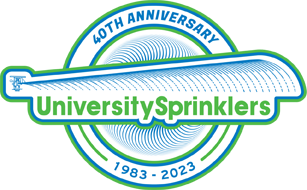Metro Vancouver has just announced Stage Three Watering Restrictions as part of the Water Shortage Response Plan, effective July 21. So how do you keep your garden alive and well during this time? Stage Three doesn’t have to mean you let your garden die. We have water-wise solutions that can save the day!
Drip Irrigation Retrofits
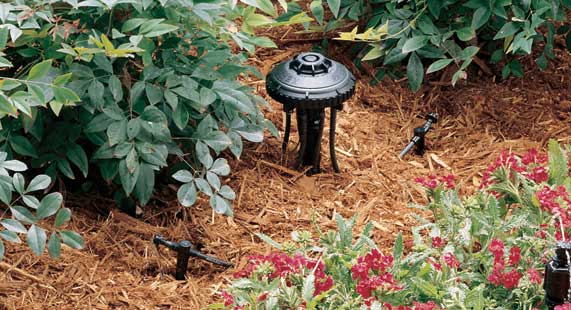 There is no better time to add drip irrigation and retrofit your garden coverage than now! Drip irrigation is unrestricted under Stage Three. Retrofitting spray-style zones to drip zones is a fantastic way to save water and irrigate plants in the most efficient automatic form possible today.
There is no better time to add drip irrigation and retrofit your garden coverage than now! Drip irrigation is unrestricted under Stage Three. Retrofitting spray-style zones to drip zones is a fantastic way to save water and irrigate plants in the most efficient automatic form possible today.
Drip irrigation in the landscape can take a number of forms: for gardens with few shrubs and perennials planted throughout, “point-source” drip irrigation is usually best suited. This particular design uses one or two emitters per plant, their output sized relatively with other plants on that drip zone so that large shrubs receive more water than smaller ones.
Another form of drip irrigation that is more commonly used for more densely planted shrub, ground cover and perennial plantings is a system of liner grid drip-line installation. In this system, 1/2″ tubing with drip emitters spaced at 12″ or 18″ intervals is buried just below the surface. The drip tubing is installed in rows, usually 12″ or 18″ apart running parallel until the entire garden is covered with a “grid” of tubing.
Contact Us today for a quote on retrofitting your system with drip irrigation. You’ve invested too much in your garden to let it die under Stage Three!
Call 604-421-4555 or 1-877-421-4555.
Rainwater Harvesting Systems
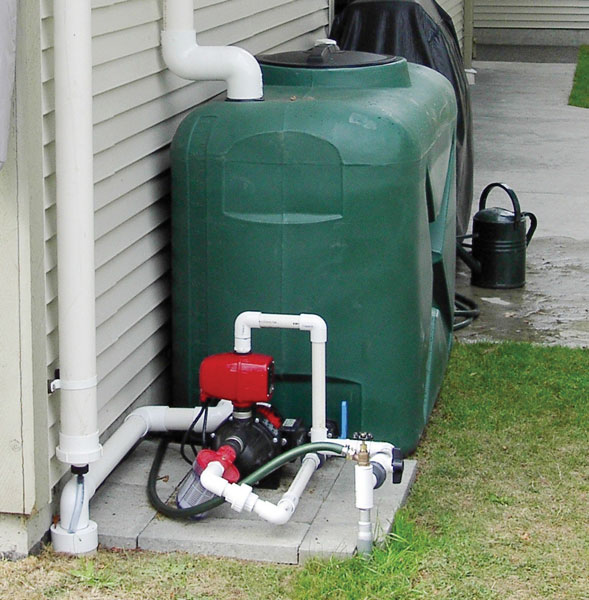 Watering restrictions only apply to treated drinking water — which for most in the region, is what comes out of the tap or hose. None of these restrictions, even under Stage Four, apply to the use of rainwater, gray water, any forms of recycled water. So if you are practicing Rainwater Harvesting, you have it made in the shade… if you can find any!
Watering restrictions only apply to treated drinking water — which for most in the region, is what comes out of the tap or hose. None of these restrictions, even under Stage Four, apply to the use of rainwater, gray water, any forms of recycled water. So if you are practicing Rainwater Harvesting, you have it made in the shade… if you can find any!
University Sprinklers has rainwater harvesting experts on staff who can design an affordable rainwater harvesting system that essentially grants you immunity to watering restrictions. Collection systems range from 10,000-gallon cisterns to 40-gallon rain barrels.
We are proud members of the American Rainwater Catchment Systems Association, an association dedicated to the promotion of the practice of rainwater harvesting, and we continue to lead the irrigation industry in water wise technologies. With University Sprinklers’ Accredited Rainwater Harvester distinction from the American Rainwater Catchment Systems Association, we continue to show our commitment to obtaining the certification and education needed to further develop our commitment to saving water.
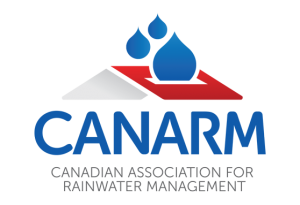 We are also members of CANARM, the Canadian Association for Rainwater Management. CANARM is a resource for education, awareness, training, and connectivity for various groups and individuals involved in the rainwater industry in Canada. We are also very proud that University Sprinklers’ Residential Sales and Service Manager, Whalen Bishop is now a member of the Board of Directors at CANARM. Whalen is very excited about rainwater’s future relationship with irrigation design.
We are also members of CANARM, the Canadian Association for Rainwater Management. CANARM is a resource for education, awareness, training, and connectivity for various groups and individuals involved in the rainwater industry in Canada. We are also very proud that University Sprinklers’ Residential Sales and Service Manager, Whalen Bishop is now a member of the Board of Directors at CANARM. Whalen is very excited about rainwater’s future relationship with irrigation design.
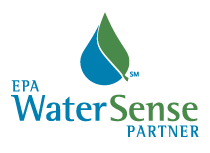 Additionally, our VP David Pfortmueller is a member of the Environmental Protection Agency’s WaterSense Program through the Irrigation Association in the United States.
Additionally, our VP David Pfortmueller is a member of the Environmental Protection Agency’s WaterSense Program through the Irrigation Association in the United States.
Contact Us today for a quote on rainwater harvesting.
Call 604-421-4555 or 1-877-421-4555.
If Your Irrigation System Already Has Drip Zones…
Isolating your drip zones when you irrigate:
While almost every system has more than one zone, some systems are designed with different zones for grass, gardens and drip zones like hanging baskets. These systems are generally more costly and allow independent timing (both different durations, start times, and days) between the various zones. If you have such a system, you can alter the timing so that only drip zones remain active and all other zones are turned off. If your system does not have separate zones for drip functions, they can be altered for separation to allow for the above independent control – give our office a call if you are interested in the cost of this investment / upgrade.
How to reset your timer so that all non-drip irrigation functions are turned off:
You can find instructions to reset your timer via our Timer Manual Page. Also, here are three videos from Rain Bird, explaining how to program one of their more common timers, the ESP-Me Series Sprinkler Timer:
Please call our office if we can be of further assistance. However, please be patient with us during this exceptionally busy time. We are getting lots of calls from clients needing help, and we are responding as fast as we can, with all hands on deck!
A Recap: What Stage Three Looks Like
- All forms of lawn watering using treated drinking water will be banned completely, for sprinklers of any type. New lawns, cemetery lawns, ornamental lawns belonging to municipal buildings, and grassed boulevards will not be exempt.
- Watering of shrubs and trees, flower and vegetable gardens, and decorative planters will not be permitted unless done by hand using a spring-loaded shutoff nozzle nozzle, containers or drip irrigation systems.
- Watering of gardens and planters using sprinklers or soaker hoses is prohibited.
- Pressure washing is equivalent to hosing of an outdoor surface. Only commercial pressure washing to prepare a surface for painting, sealing or similar treatment will be permitted. Pressure washing for the purpose of aesthetic cleaning will not be permitted. Private pressure washing will be prohibited.
- Exterior washing of vehicles (e.g. cars, motorcycles, recreational vehicles, trucks, boats and other marine vessels) will be prohibited, except for safety (windows, lights, licenses) and only then if using a springloaded shutoff nozzle. This includes residential, commercial, institutional and government vehicles.
- Ornamental fountains must be shut down. This includes residential, commercial, institutional and
government fountains. - Only water play parks with user-activated switches will operate.
- Filling or refilling of garden ponds, hot tubs, or swimming pools will be prohibited.
- Exemptions:
- Watering of turf at turf farms and flowers and vegetable at commercial gardens.
- Commercial car washes may continue to operate in this stage, as studies have shown that commercial car washes use significantly less water per vehicle than manual washing.
- Golf courses may water greens and tee areas at minimum levels required to maintain areas in useable condition; fairways may not be watered.
- Sports playing fields (including sand-based) and school yards may be watered at minimum levels required to maintain areas in useable condition.
- Artificial turf requiring wetting and outdoor tracks if required for dust control or safety reasons.
- Hosing of outdoor surfaces (e.g. driveways, sidewalks, roofs) only if required to avoid public health and safety concerns or to prepare a surface for painting/sealing or similar treatment.
